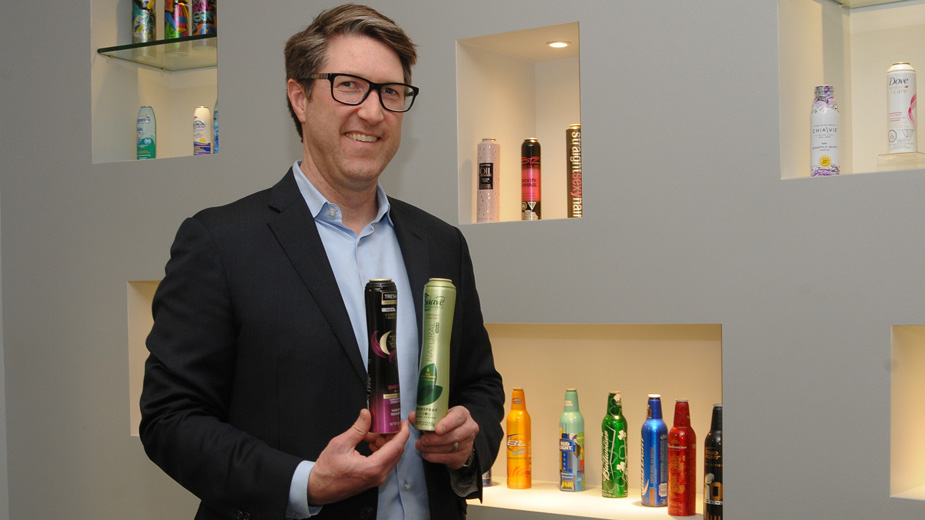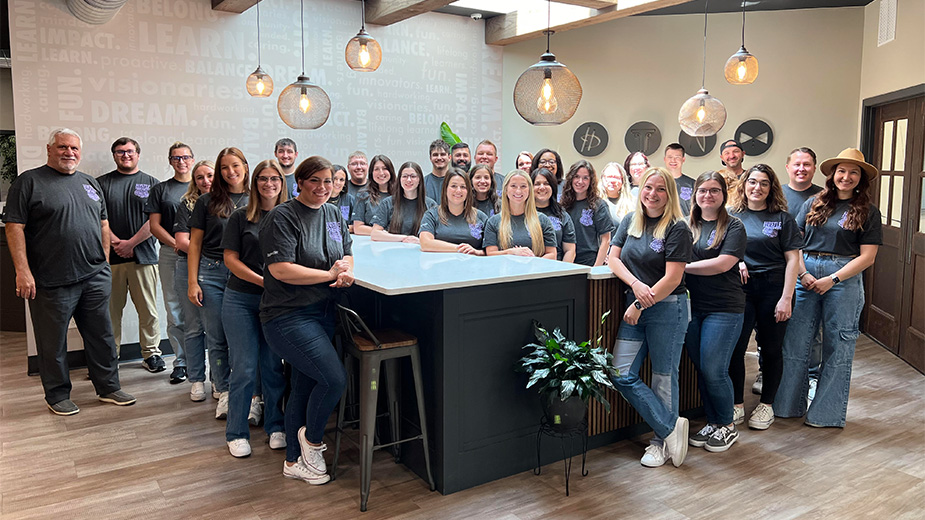25 Years Later, Exal Plant Remains Sleek, Innovative
YOUNGSTOWN, Ohio – Most consumers in the region don’t realize that the aluminum bottle of Coca-Cola or Pepsi they just bought at the local grocery store most likely originated in their own backyard.
Add popular international brand and corporate names such as Loreal, Dove, Budweiser, Barbasol, Pledge, Arm & Hammer, Bayer, Kraft, Smucker’s, and a host of others to the list – and you have tens of millions of people in North America who come into contact everyday with the manufacturing handiwork of the Mahoning Valley.
“It’s a great time to be in the aluminum packaging industry,” says Michael Mapes, CEO of Exal Corp., which for 25 years has operated in the Performance Place Business Park in Youngstown. “This is our world headquarters and we supply all of North America with our product.”
Exal has long been touted as one of the city’s great manufacturing success stories. The company was established and the plant constructed in 1993 by Delfin Gilbert, who bought land in the new industrial park that the city developed in the wake of the steel industry’s retrenchment. In 2010, the company was sold to the Ontario Teachers Private Pension Equity Fund, which manages Exal through a board of directors.
The company manufactures aluminum containers for the beverage, aerosol, home products and beauty industries. The plant in Youngstown supplies all of North America with these products. Two other plants – in Brazil and Argentina – supply the Central and South American markets.
Over the last 25 years, Exal has expanded many times, growing from a single aluminum-container production line in 1993 to the 14 in Youngstown today, Mapes says, and the market has never been better.
Companies that specialize in selling consumer packaged goods, or CPGs, today are especially keen on developing innovative sleek designs to package and market their products, Mapes says, and Exal’s capabilities more than address their needs. “Brands are looking for opportunities to get their product to really stand out,” he says. “We have the capability to shape aluminum into lots of different shapes and sizes.”
Thus, Exal devotes substantial time to the research and development of the shape, color scheme and design of a container.
“Innovation is very critical,” says Tom Chupak, director of R&D and innovations. He is one of the first employees hired at the plant 25 years ago. “We have to develop an eye-catching container to meet the customer’s needs,” he says. “We have to stay on top of new designs so consumers can grab it off the shelf.”
Chupak says the company experiments with different alloys and shapes for containers, searching for that perfect design that makes the customer’s item stand out among a sea of other products. “The company is strong and business is very good right now,” he says. “We have a lot of new product designs and shapes due to hit the market soon.”
Aluminum packaging resonates well with consumers, Mapes says, because so many people today are more environmentally conscious and recognize that aluminum is one of the most reused metals in the world.
“It’s infinitely recycled,” he says. “More people are concerned about the environmental impact of a product.”
Investment is a vital component to Exal’s continued success as well, Mapes says. Last year, the company spent more than $30 million across all three plants to upgrade and modernize its production capabilities. This year, the capital budget is roughly $34 million – $10 million of which is earmarked for Youngstown.
“We’re putting real money into this facility,” Mapes says. Among the investments slated for Youngstown are the upgrade of an existing line and the installation of a new production line, he says. “This will improve our advanced shaping, printing and graphic capabilities in the marketplace.”
More than 350 people work at the plant in Youngstown; Exal employs 1,000 companywide, Mapes reports. Over the last two years, the operation in Performance Place has undergone a front office makeover and changes in management.
Mapes, a native of Columbus, came on board as CEO in 2016. Since then, Exal has improved its safety record by 60% and the parts-per-million defect rate on its aluminum packaging products dropped by 72%. “We were already running at a strong rate,” he says.
The company’s production lines are fully automated, capable of turning what starts out as a small aluminum slug and ultimately transfers the image and colors onto the container during the production process.
Aluminum slugs are first fed into a lubrication operation before they enter an enclosed extrusion line, where the small slugs are formed into a cylinder. Once the cylinder forms, the product passes through what is called the “neck down” process, in which the containers are formed, printed and dried.
“We can print anywhere from one to 15 colors,” says Kyle Bacich, who oversees Exal’s print operation on a line in the process of manufacturing a container for Up Time brand energy drink. With lightning speed, a base coat and inside liner coat is applied on the container as it rotates. After a second coat, the print design is affixed to the container, which is then dried.
“In general, these lines are interchangeable,” Mapes says, noting that most of the production lines can accommodate the majority of designs and shapes, although a few contain machines with capabilities relative to length and width of a particular design. The plant is capable of pumping out an average of more than one million aluminum containers per day.
“Our ability to print around the entire container really makes it stand out,” Mapes says.
At the end of the process, a newly shaped aluminum container emerges from the line, is bundled with others, and then prepared for shipping.
“I inspect the finished curl, looking for dents and scratches and anything that isn’t perfect,” says Patrick Carfangia, who is carefully examining some finished bottles as they leave the line. “If it’s not perfect, we don’t want it.”
Meanwhile, as the aluminum packaging industry is enjoying strong demand, Exal is winning additional business, the CEO reports.
“We’re seeing growth in all the regions we operate in,” Mapes says. “We’ve got a phenomenal workforce here. And development of our talent is absolutely critical. To continue to be at the forefront, you have to invest. Not just in physical assets, but in people and capabilities.”
Pictured: Michael Mapes, CEO of Exal, holds two of the products turned out at the plant.
Copyright 2024 The Business Journal, Youngstown, Ohio.


